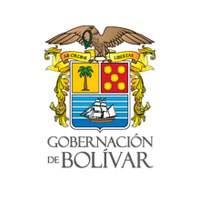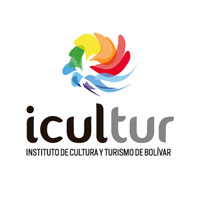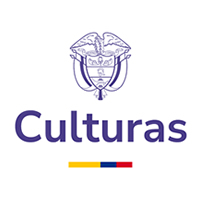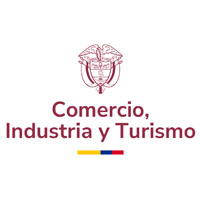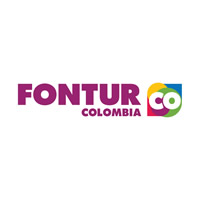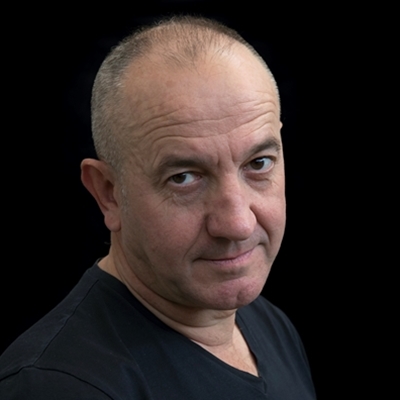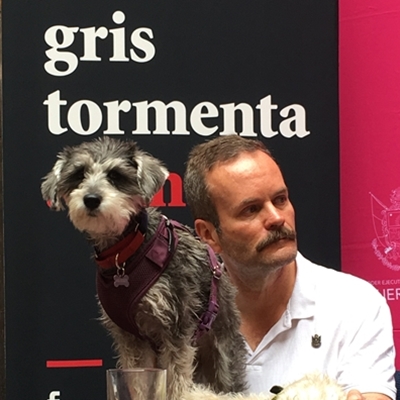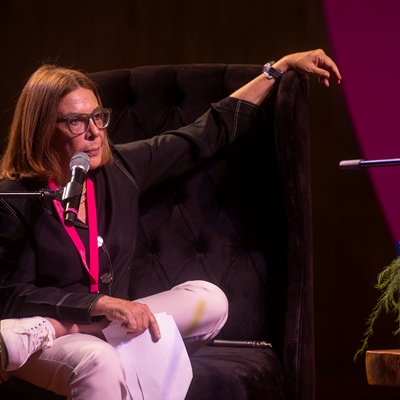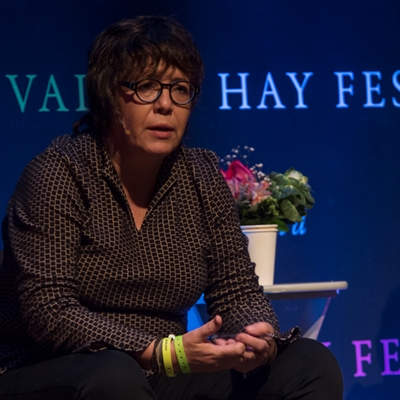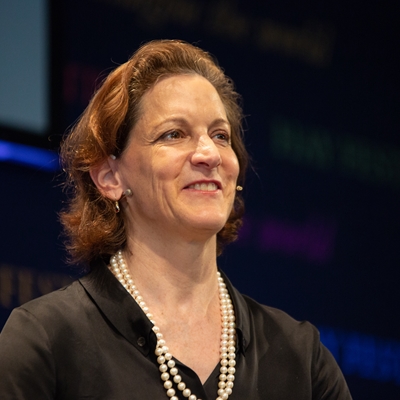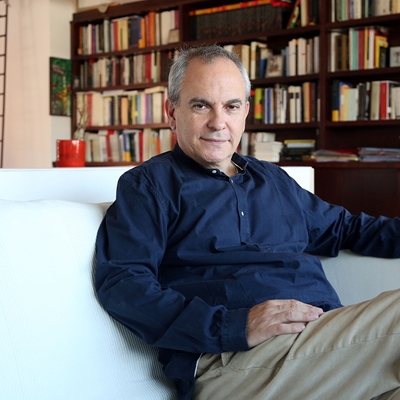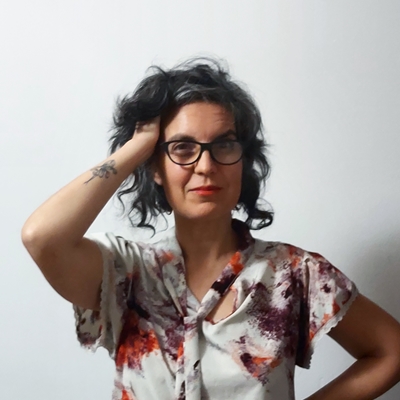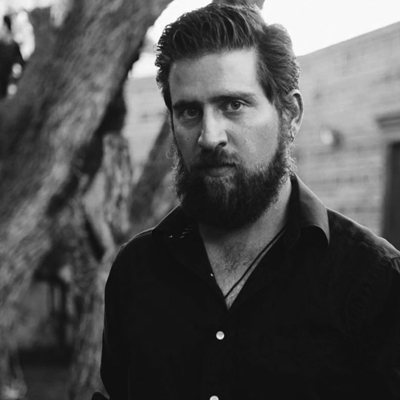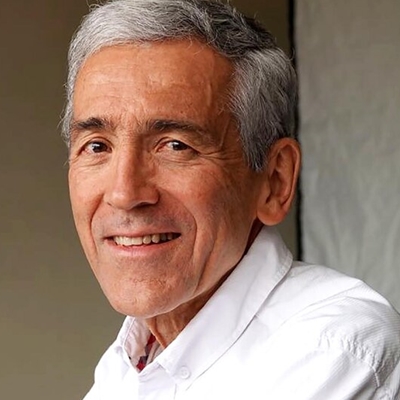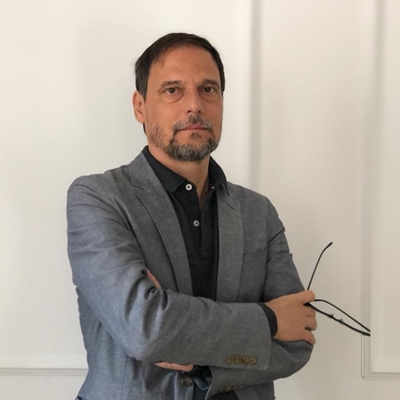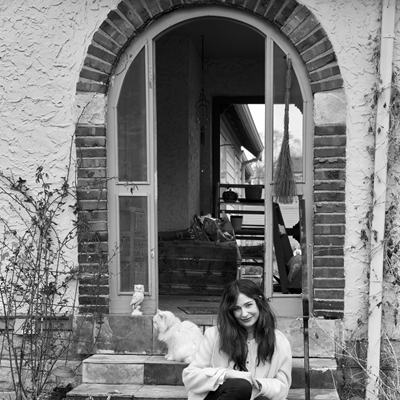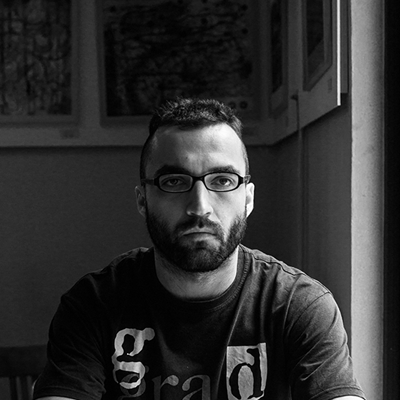Hay Festival Colombia Digital
Hay Festival Colombia took place from 21 to 30 of January 2022, with events in the cities of Cartagena de Indias, Medellín and Jericó. You are currently browsing the digital programme of the festival.
If you want to browse the in-person events of Hay Festival Cartagena de Indias, click here.
If you want to browse the in-person events of Hay Festival Medellín, click here.
If you want to browse the in-person events of Hay Festival Jericó, click here.
Event 1
When the first Russian rockets fell on Kyiv on February 24 2022, novelist, essayist and writer Andrey Kurkov started keeping a diary. His entries – providing a first-hand account of what it’s like to live through an active conflict – were published in the book Diary of an Invasion. Kurkov’s writing chronicles the terrible impact of the conflict through his personal experiences, giving an intimate look at Ukrainian identity and the day-to-day lives of his fellow citizens. He and Jonathan Franzen – author of six novels including The Corrections, and five works of nonfiction – discuss their work, the role of literature during war, and the responsibility of the artist in times of conflict. Chaired by the Guardian’s chief culture writer Charlotte Higgins.
Closed captions are available for this event in English and Spanish. Click on the "cc" icon in the video frame to select.

Event 30-FR
Philippe Claudel in conversation with Gabriel Hörner (French version)
Teatro de la Ciudad
The award-winning French writer and film and television director Philippe Claudel is the author of 16 novels, translated into at least 11 languages. His most recent book, which has already sold 200 thousand copies around the world, is La petite fille de Monsieur Lihn (2020), the story of a man who, fleeing war, arrives on the French coast with his granddaughter in his arms: he does not know where he is and has no knowledge of the language. Claudel talks to Gabriel Hörner about his writing and his cinematographic vision.
Buy books by Philippe Claudel at Librerías Gandhi
Register to watch onlineWith the support of the UNAM
Buy the book for this event
Event 2
Can books about past wars prepare for future wars? Conversation about the similarities and differences between the war in the Balkans and Russia's war against Ukraine. About this in a conversation between Bosnian writer Ozren Kebo and Ukrainian writer and translator from Bosnian Kateryna Kalytko.

Event 31
Sabina Berman in conversation with Gabriela Warkentin
Escenario Digital Hay Querétaro
The fiction writer, dramatist and journalist Sabina Berman has, for some time, been an important presence on the Mexican cultural scene, having created plays that have become milestones for our time. These include Entre Pancho Villa y una mujer desnuda and Feliz nuevo siglo, doktor Freud. She has also won prizes, including the Frankfurt International Book Fair award for her novel La mujer que buceó dentro del corazón del mundo, translated into numerous languages. This time she presents her most recent novel, HDP, in which a businessman by the name of Hugo David Prado, who lives in the upper reaches of wealth and power, decides to use a global pandemic for his personal benefit. In conversation with the journalist Gabriela Warkentin.
Buy HDP by Sabina Berman at Librerías Gandhi
Register to watch onlineBuy the book for this event
Event 32
Anne Applebaum in conversation with Ana Laura Magaloni (Spanish version)
Democracy in danger
Teatro de la Ciudad
Although just a few years ago it would have seemed impossible, there now exists a considerable consensus around the idea that Western democracies are in serious danger, faced with the rise of authoritarianism, nationalism, autocracy and the extreme right. The writer and historian Anne Applebaum (United States), winner of the Pulitzer Prize for Nonfiction for Gulag (2004), presents her most recent book, which tackles these and other themes: Twilight of Democracy. The Seductive Lure of Authoritarianism (2020). Applebaum argues that through poisonous, simplistic and seductive messages, authoritarianism uses the media, the social media, political polarization and conspiracy theories to set up a worrying attack on democratic values, values that are defended in her book. She will talk to the jurist and academic Ana Laura Magaloni.
Buy books by Anne Applebaum at Librerías Gandhi
Register to watch onlineEvent sponsored by SURA
Buy the book for this event
Event 3
Uilleam Blacker, Georgi Gospodinov (digital) and Ostap Slyvynsky in conversation with Katherine Younger
Remembering Our Way to the Future
Digital venue
“It's been written that the past is a foreign country. Nonsense. The past is my home country. The future is a foreign country, full of strange faces, I won't set foot there,” says the narrator of Time Shelter, the 2023 International Booker Prize winning novel by Bulgarian writer Georgi Gospodinov (he will join remotely). Hopelessness about the future feeds the beasts of the past. The violent consequences of this turn are all too obvious: Russia is waging “a war not only for territory, but also for time,” as Gospodinov has put it, seeking to drag Ukraine and Ukrainians into a warped vision of the past.
But it is precisely Ukrainians’ commitment to and hope in the future that sustains them in their fight, bolstered by the memory of generations past. Can memory serve as an antidote to invented histories, thereby “holding the past at bay”? How can the stories we tell and read shape our understanding? Georgi Gospodinov, writer and translator Ostap Slyvynsky, and literary scholar and translator Uilleam Blacker speak with historian Katherine Younger about our stories and dreams of the past and memory's role in shaping the future.
Closed captions are available for this event in English and Spanish. Click on the "cc" icon in the video frame to select.
In collaboration with the Institute for Human Sciences (IWM Vienna)
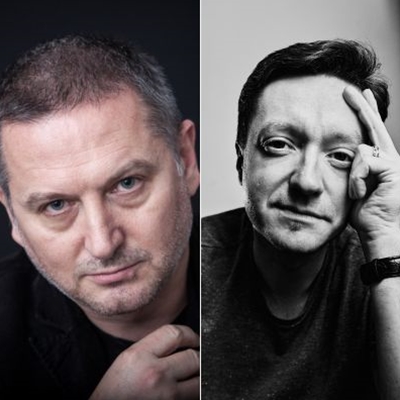
Event 4
Anne Applebaum (digital), Slavenka Drakulich (digital), Vakhtang Kebuladze and Maksym Yakovliev, chaired by Tetiana Oharkova
War as the collapse of civilization: can there be happiness after war?
Digital venue
How do we define when a war is won? Is it simply victory on the battlefield? A return of territory and lives saved? Or does victory also include the more intangible, such as the protection of our humanity and trust in the world, and the ability to still feel happiness and love in the aftermath of tragedy and trauma?
Philosopher, writer and translator Vakhtang Kebuladze, journalists Slavenka Drakulich (she will join remotely) and Anne Applebaum (she will join remotely), and Maksym Yakovliev look at what happens after war is over. They talk to the journalist and essayist Tetiana Oharkova about how we should communicate with people who have survived war, whether it’s possible to feel happiness after trauma, and whether wars represent new beginnings.
Closed captions are available for this event in English and Spanish. Click on the "cc" icon in the video frame to select.

Event 33
Pablo d’Ors and Mónica Nepote in conversation with José Manuel Velasco
Into the country of silence
Centro Cultural Comunitario Carrillo Puerto
The Queretaro publishing house, Gris Tormenta, presents a beautiful collection of texts in which different authors from different countries reflect on something that is necessary to us in order to be fully human: silence, something that is becoming ever rarer in our world. The writer, theologian, priest, practitioner of Zen meditation, and founder of the Amigos del Desierto association, Pablo d’Ors (Spain), and the publisher and writer Mónica Nepote (Mexico), talk to the book’s editor, José Manuel Velasco.
Buy books by Pablo d'Ors at Librerías Gandhi
Register to watch onlineWith the support of AC/E
Buy the book for this event
Event HJ4
On the 25th of July this year, the city of Santiago de Queretaro will celebrate its 490th anniversary: almost five centuries of history involving indigenous peoples, colonialism, the city’s crucial role in Mexican independence, and contemporary culture. For these reasons, Queretaro has been a UNESCO World Heritage site since 1995. However, there are a series of myths and legends regarding the prehispanic origins of the city, who were its first peoples who came in contact with the Spaniards and how its founding took place. Fiorella Fenoglio, a research archaeologist at the INAH Queretaro Centre, a heritage expert and a tireless promoter of cultural patrimony, will present a lecture on Queretaro’s material culture, in this very special year.
Event for university students

Event 5
Timothy Garton Ash, Emma Graham-Harrison, Oleksandra Matviichuk (digital), Sevgil Musaeva and Oleksandr Sushko, chaired by Kristina Berdinskikh
Marshall Plan for Ukraine: what future awaits the world after the Ukrainian victory
Digital venue
In 1948, the United States of America enacted the Marshall Plan, an initiative to provide foreign aid to Western Europe to help it recover after the Second World War, and to boost the world economy. A panel of experts discuss how a modern version of the Marshall Plan from countries across the world is needed in the wake of the war in Ukraine.
The war has, and will continue to have, long-reaching and long-lasting effects outside the borders of the country economically. Historian Timothy Garton Ash, journalists Emma Graham-Harrison and Sevgil Musaeva, human rights lawyer Oleksandra Matviichuk (she will join remotely) and Oleksandr Sushko, Research Director at the Institute for Euro-Atlantic Cooperation in Kyiv and member of the Maidan People's Union council examine how the war is affecting money, investment and more. From looking at the long-term dangers of a peace on Russian terms to what Ukraine has to offer to the world and what can be done to communicate Ukraine's economic potential, the group will argue that supporting Ukraine's reconstruction and the full restoration of Ukraine's sovereignty and territorial integrity can stabilise global food and energy markets. Journalist Kristina Berdinskikh chairs.
Closed captions are available for this event in English and Spanish. Click on the "cc" icon in the video frame to select.
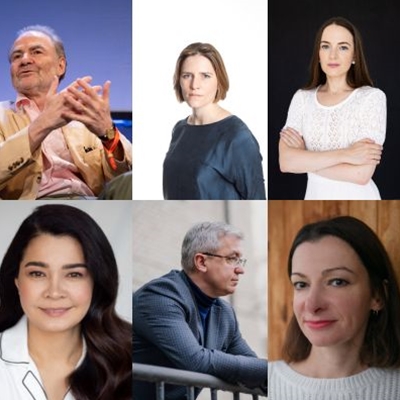
Event 32-En
Anne Applebaum in conversation with Ana Laura Magaloni (English version)
Democracy in danger
Teatro de la Ciudad
Although just a few years ago it would have seemed impossible, there now exists a considerable consensus around the idea that Western democracies are in serious danger, faced with the rise of authoritarianism, nationalism, autocracy and the extreme right. The writer and historian Anne Applebaum (United States), winner of the Pulitzer Prize for Nonfiction for Gulag (2004), presents her most recent book, which tackles these and other themes: Twilight of Democracy. The Seductive Lure of Authoritarianism (2020). Applebaum argues that through poisonous, simplistic and seductive messages, authoritarianism uses the media, the social media, political polarization and conspiracy theories to set up a worrying attack on democratic values, values that are defended in her book. She will talk to the jurist and academic Ana Laura Magaloni.
Buy books by Anne Applebaum at Librerías Gandhi
Register to watch onlineEvent sponsored by SURA

Buy the book for this event
Event 6
Ukrainian Jewish Encounter Prize Ceremony
Digital venue
Encounter: The Ukrainian-Jewish Literary Prize ™ is designed to be based on the common centuries-old experience of Ukrainians and Jews, which has found expression in fiction and non-fiction literature. The prize is awarded annually for the most influential work of fiction and non-fiction (in 2023 - fiction) that promotes Ukrainian-Jewish understanding, helping to strengthen the position of Ukraine as a multi-ethnic society and embodying the motto "Our stories are incomplete without each other". The award ceremony will be held with the participation of Ukrainian writer Sofia Andrukhovych, whose novel Amadoka won the 2023 prize; Marjana Savka, editor-in-chief of The Old Lion Publishing House; Olha Mukha, curator of congresses, committees and new centers of PEN International; Oksana Forostyna, Co-founder at Yakaboo Publishing, editor, translator and writer; Natalia Feduschak, communication director of the Ukrainian Jewish Encounter.

Event 7
This year it turns 10 years since Lockwood & Co was published. Meet Jonathan Stroud (he will join remotely), the author of the cult text. The moderator of the conversation is Volodymyr Arenev, a Ukrainian fiction writer.
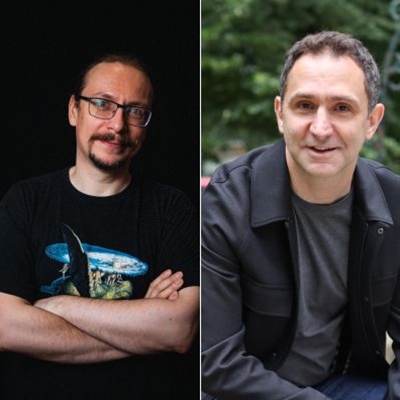
Event 14
Jaroslava Barbieri, Janine di Giovanni, Ian Garner (digital) and Sofi Oksanen (digital), chaired by Peter Pomerantsev
Freedom of thoughts vs indoctrination
Digital venue
How do you take a whole group of people, destroy their identity and force a new one on them? That is Russia’s aim in Ukraine. What methods do they use; does it work, and how does it compare to other examples across the world and in history?
Ian Garner and Sofi Oksanen will join remotely.

Event TE6
Talento Editorial. Eduardo de la Garma, Jacobo Zanella and Ana Paula Zárate in conversation with Gabriel Hörner
Lo local también existe. Querétaro como ejemplo
Sede Talento Editorial
With the support of AECID

Event 9
Elif Batuman, Kateryna Kalytko, Taras Prokhasko, David Toscana (digital) and Iryna Tsilyk, chaired by Sasha Dovzhuk
Existential resilience: how global historical changes affect who we are
Digital venue
Through the war with Russia, Ukraine has emerged as an unexpected hero in a battle for freedom in Europe – a battle few could have predicted. The conflict has led many, inside and outside of the continent, to rethink the political and moral ideas that we have taken for granted since the Second World War ended.
Using literature and the ways in which it helps us make sense of critical points in history and how colossal changes affect people's ways of thinking and feeling, a panel discusses ideas of heroism and how literature can help these sceptics of Ukraine understand its quests and feats. Novelist Elif Batuman, writer Kateryna Kalytko, filmmaker Iryna Tsilyk, writer David Toscana (he will join remotely) and novelist Taras Prokhasko will also talk to writer Sasha Dovzhuk about how literature can help people feel with Ukrainians and learn from the mistakes of the past.
Closed captions are available for this event in English and Spanish. Click on the "cc" icon in the video frame to select.

Event 34
El País event: Francisco de Roux in conversation with Jan Martínez Ahrens
Escenario Digital Hay Querétaro
The chair of the Colombian Truth Commission, Francisco de Roux, will talk about this extraordinary analysis carried out in the country in order to establish a legal and sociological framework given the impact of decades of violence. The work of this commission has become a model for similar peace processes around the world. De Roux will talk to the editor of El País Mexico, Jan Martínez Ahrens.
Buy La audacia de la paz imperfecta by Francisco de Roux at Librerías Gandhi
Register to watch onlineEvent organised together with El País
Buy the book for this event
Event 10
Emma Antoniuk, Vakhtang Kebuladze and Peter Pomerantsev, chaired by Olena Huseinova
Modern Mythologies: do we still need heroes in the 21st century?
Digital venue
The creation of heroic narratives has been widespread in art and literature across time and cultures. This panel will explore how we mythologize in the modern world, what stories we expect, and whether heroes still satisfy our aesthetic sensitivity in the 21st century.
Emma Antoniuk, philosopher and writer Vakhtang Kebuladze and journalist Peter Pomerantsev explore how we mythologize in the modern world, what stories we expect, and whether heroes still satisfy our aesthetic sensitivity in the 21st century. Chaired by poet Olena Huseinova.

Event 35
Hay Fórum Dallas: Anne Boyer in conversation with Eduardo Rabasa
Teatro de la Ciudad
Among the many things wrong with our current socioeconomic system is not just the fact that healthcare is a privilege for the few, but that a whole illness industry exists that is structured around making a profit from those who are unwell, often with serious illnesses. The poet, essayist and lecturer Anne Boyer (United States) won the 2020 Pulitzer Prize for Nonfiction for The Undying. A Meditation on Modern Illness, an acute and lucid work that tells of her own experience as a survivor of an aggressive breast cancer, which led her to live through and understand some chilling realities. Boyer is also the author of books such as The Romance of Happy Workers (2008), The 2000s (2009), Garments Against Women (2015) and A Handbook of Disappointed Fate (2018). In conversation with Eduardo Rabasa.
Buy Desmorir by Anne Boyer at Librerías Gandhi
Register to watch onlineBuy books by Eduardo Rabasa at Librerías Gandhi
Register to watch onlineSubscribe to Bookmate and read 'Desmorir' by Anne Boyer
Register to watch onlineEvent 11
Pankaj Mishra (digital) and Volodymyr Yermolenko, chaired by Sevgil Musaieva
The art of decolonization
Digital venue
Indian essayist Pankaj Mishra joins Ukrainian philosopher Volodymyr Yermolenko to explore the ways Russia's assault on Ukraine has forced Europe to confront its colonial past and present. Chaired by Ukrainian journalist Sevgil Musaieva.
Bektour Iskender and Panjak Mishra will join remotely
Closed captions are available for this event in English and Spanish. Click on the "cc" icon in the video frame to select.
The event is in partnership with Ukrainska Pravda.
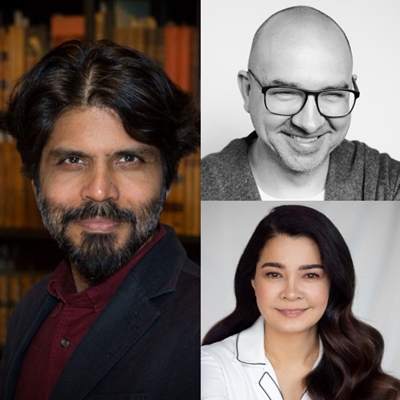
Explore All Genres
- 20 Questions
- Afrodescendencias
- South to South
- Architecture
- Art
- Arts & Culture
- Biography
- Children
- Culture
- Economics
- Education
- Equality
- Fiction
- Film
- Gender
- Globalisation
- History
- Human Rights
- Indigenous Cultures
- Journalism
- Literature
- Maths
- Memoir
- Music
- Nature & Environment
- Philosophy
- Photography
- Podcast
- Poetry
- Politics
- Science
- Technology
- Thinking
Partner for Latin America

Principal Sponsors



Government Partner

